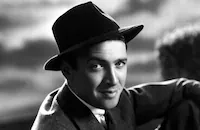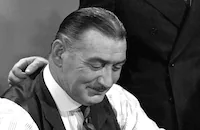Seventh Heaven
Brief Synopsis
Cast & Crew
Henry King
Simone Simon
James Stewart
Jean Hersholt
Gregory Ratoff
Gale Sondergaard
Film Details
Technical Specs

Synopsis
In 1914, in the infamous Paris district called "The Sock," sewer cleaner Chico rescues the timid Diane as she is being beaten by her brutal sister Nana for not entertaining a male customer in Nana's seedy café. While Chico is lamenting his fate and discussing his atheistic beliefs with his friends, Boul and the Sewer Rat, kindly Father Chevillon offers to get Chico a coveted job as a street washer if he will care for Diane and try again to believe in God. Chico agrees, and when Nana's angry customer brings the police to the café, Chico tells them that Diane is his wife so that they will not arrest her. One of the gendarmes threatens to come to Chico's apartment to check on their story, and so Chico is forced to take Diane home with him. As the pair talk, the brash and cheerful Chico tries to impart his optimistic philosophy of life to Diane. After they climb the seven flights of stairs to Chico's airy, light-filled garret, Diane, who is used to the squalid surroundings of The Sock, declares that it is heaven. Chico laughs and sends her to bed, but that night, he lies awake thinking of her, just as she is thinking of him. After Chico leaves for work the next morning, the gendarme visits the apartment and, satisfied that Diane lives there, says he will not be back. Diane is about to leave when Chico returns and tells her they will celebrate his new job with their neighbors, the Gobins. Diane does not have the heart to tell Chico about the gendarme's visit, but after he leaves to get some wine, his eccentric neighbor Aristide chastises Diane for keeping the secret. After he accuses her of taking advantage of Chico and convinces her that her wickedness will destroy any chance he has of achieving greatness, she leaves. Chico is distraught to discover that Diane is gone, and after learning what Aristide told her, he finds her in a bar with a man who is attempting to seduce her. Chico hits the man and takes Diane home, where he tells her that she is fine and good and should remain with him. Time passes as the young people fall in love and Diane overcomes her timidity. Chico proposes to her, but on the day they are to be married, he receives a draft notice. Before he leaves, however, the lovers exchange vows and declare that they are married in the eyes of God. After they promise to think of each other every morning at 11:00, Chico leaves with Gobin. Once Chico has gone, Nana comes to the garret and attempts to take Diane back to the café, but Diane, strengthened by Chico's love, beats her sister until she flees. Four years pass as Chico fights in the trenches and Diane works as a nurse. The couple think of each other every day at 11:00 a.m. and mentally send the message "Chico, Diane, Heaven." After the war ends, Gobin and Aristide, who has become Diane's friend, try to convince Diane that Chico was killed, but she refuses to believe them until Father Chevillon gives her the medal that Chico gave to him when he lay wounded on the battlefield. Diane is heartbroken and renounces her belief in God, but when the clock strikes 11:00, she once again feels Chico's presence. She rushes home and finds Chico, who was only blinded in the explosion that was thought to have killed him. The young lovers embrace and tearfully reaffirm their belief in each other and in God.

Director
Henry King
Cast

Simone Simon

James Stewart

Jean Hersholt

Gregory Ratoff

Gale Sondergaard

J. Edward Bromberg

John Qualen
Victor Kilian

Thomas Beck

Sig Rumann

Mady Christians
Rollo Lloyd

Rafaela Ottiano
Georges Renavent

Edward Keane

John Hamilton
Paul Porcasi
Leonid Snegoff
Adrienne D'ambricourt
Evelyn Selbie
John Picorri
Gene Massett

Frank Puglia
John Bleifer
Will Stanton

Irving Bacon
Marcelle Corday
Constant Franke
Alphonse Martell
Joseph De Stefani
Eugene Borden
George Hurd
Crew
Melville Baker
William Darling
Merritt Gerstad
Raymond Griffith
David Hall
Roger Heman
Arthur Von Kirbach
Thomas Little
Barbara Mclean
Sidney D. Mitchell
Lew Pollack
Louis Silvers
Gwen Wakeling
Robert Webb
Darryl F. Zanuck

Film Details
Technical Specs

Quotes
Trivia
Notes
According to a Los Angeles Examiner news item, Tyrone Power, who had been considered for the part of Chico, was instead put into the film Love Is News by producer Darryl Zanuck because Zanuck wanted to feature him in light, romantic comedies. According to a Hollywood Reporter news item, Don Ameche was slated to play "Father Chevillon," but could not because he was also cast in Love Is News. The part was then assigned to John Carradine, but was finally given to Jean Hersholt. Hollywood Reporter also reported that photographer Merritt Gerstad was borrowed from Universal and that John Harrington was to be included in the cast, although his participation in the completed film has not been confirmed. A September 13, 1937 Hollywood Reporter news item reported that the song "Seventh Heaven," written by Lew Pollack and Sidney Mitchell, was "under consideration to be the official theme song for the New York's World Fair in 1939." Austin Strong's play was first produced as a film in 1927 by Fox. Frank Borzage directed Janet Gaynor and Charles Farrell in the immensely popular earlier version of Seventh Heaven, for which Borzage won an Academy Award for Best Director, and Gaynor won an Academy Award for Best Actress (see AFI Catalog of Feature Films, 1921-30; F2.4926). Strong's play was also dramatized on television on October 28, 1953, with J. Robert Blum directing Geraldine Brooks and Hurd Hatfield. Gloria De Haven and Ricardo Montalban starred in a short-lived musical version of the play that opened in New York on May 26, 1955.












